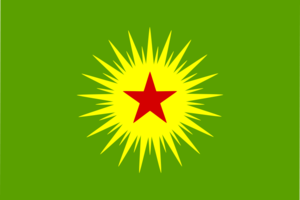Kurdistan democratic confederalists

Founded in 1975, the Kurdistan Workers Party, or PKK, traditionally operated as a Marxist-Leninist party, demanding Kurdish independence from Turkey. A quarter-century later, their struggle took a sharply anarchistic turn, due in part to the influence of anarchist writer Murray Bookchin. The PKK and other rebels have since established a confederation of direct democratic communal institutions across Turkish Kurdistan. KCK-affiliated groups have expanded the anti-authoritarian Kurdish social revolution into Iran, Syria and Iraq.
In 1999, PKK leader Abdullah Öcalan was arrested by Turkish authorities, and in prison Öcalan became heavily influenced by American anarchist Murray Bookchin and the Zapatistas. Öcalan came to embrace Bookchin's theory of Communalism and renamed it "democratic confederalism." As Öcalan reflected and criticized his party's authoritarian past, Öcalan's followers too became swayed. Rafael Taylor writes, "The PKK itself has apparently taken after their leader, not only adopting Bookchin's specific brand of eco-anarchism, but actively internalizing the new philosophy in its strategy and tactics. The movement abandoned its bloody war for Stalinist/Maoist revolution and the terror tactics that came with it, and began pursuing a largely non-violent strategy aimed at greater regional autonomy."[1]
The PKK and other Kurdish rebels have established a direct democratic confederation, called the Group of Communities in Kurdistan or the KCK. The KCK makes decisions at five levels: the village, the neighborhood, the district, the city, and the region (northern Kurdistan). Taylor reports, “The informal consensus among witnesses, nevertheless, is that the majority of decision-making is directly democratic through one arrangement or other; that the majority of those decisions are made at the grassroots; and that the decisions are executed from the bottom-up in accordance with the federal structure.” The highest level of the the KCK, the Democratic Society Congress or DTK,requires that women constitute at least 40 percent of each assembly. Although DTK members include representatives of a wide variety of Kurdish civil society organizations, 60 percent of DTK members are recallable delegates from the direct democratic grassroots.
In 2014, KCK fighters, including the PKK, gained significant attention internationally for their fight against the far-right Islamist group ISIS.[2]
- ↑ Rafael Taylor, "The new PKK: unleashing a social revolution in Kurdistan, ROAR Magazine, 17 August 2014, http://roarmag.org/2014/08/pkk-kurdish-struggle-autonomy/.
- ↑ Taylor, “The new PKK”.
--DFischer (talk) 22:51, 10 September 2014 (EDT)